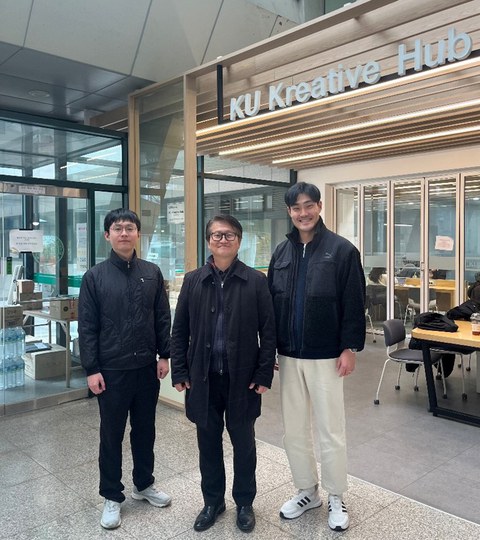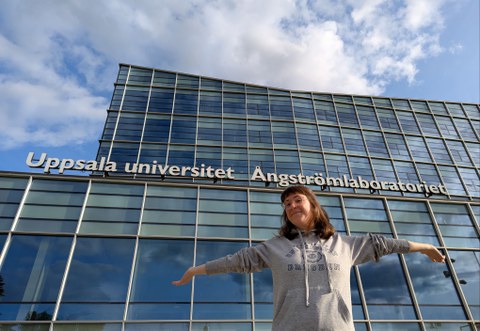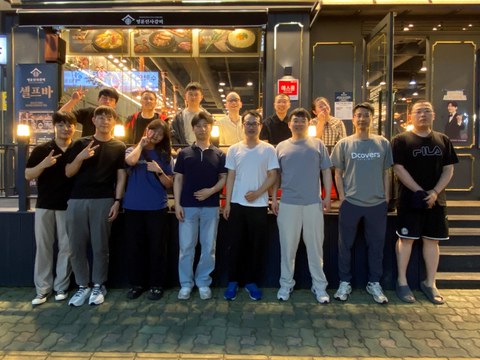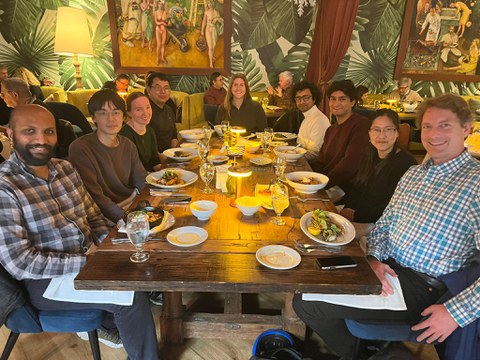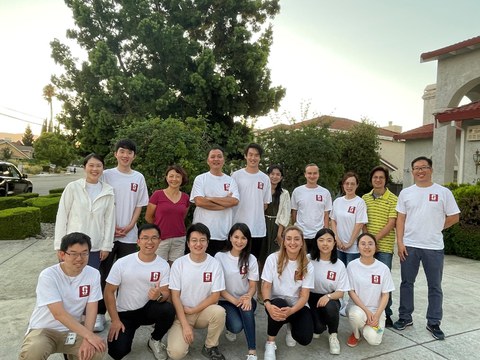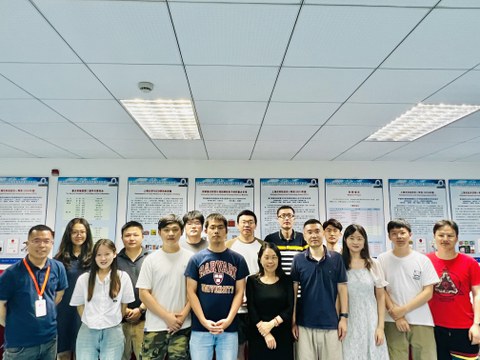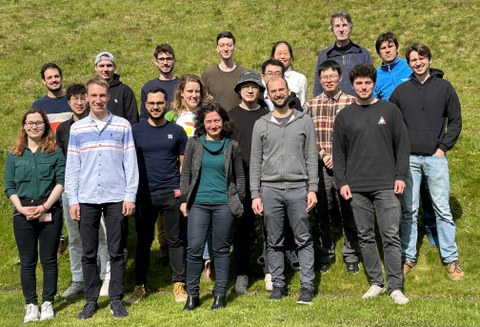Support
The MGK-2DMs provides a variety of support offers that help the students individually in their respective stages of their doctoral research and planned career.
Scholarship
The MGK-2DMs offers scholarships for qualified doctoral researcher applicants who wish to begin their doctorate within the next few months on a MGK-relevant research topic and for whom a continuation within the CRC 1415 after the scholarship is planned. Application documents can be submitted at any time (crc1415@tu-dresden.de; keyword "MGK Scholarship"). The documents must be submitted in English language only: tabular curriculum vitae, letter of motivation, project-related work plan for the duration of the scholarship, supporting letter of the supervisor, taking into account a 3-years perspective (thematically & financially).
Travel Grants
The MGK-2DMs will support young researchers with travel grants that allows them to work for short period of time in a research group outside of Germany. The duration of such a visit will be 2-6 months and the hosting university or institute should be an international collaboration partner of the supervisor. To apply for a travel grant get in contact with the MGK management. Reports from former awardees:
The electrical characteristics were investigated using a field-effect transistor (FET) device during this academic exchange. Our group recently optimized an atomic layer deposition (ALD) process for Bi₂O₂Se by combining the Bi₂O₃ and Bi₂Se₃ ALD cycles. To obtain a deeper understanding of the material properties, we conducted FET measurements in collaboration with Prof. Sung Ho Jhang’s Quantum Transport and Electronics Lab at Konkuk University. To define the active Bi₂O₂Se channel, a chemical etching process was employed. A mixture of sulfuric acid, H₂O₂, and deionized water in an optimized ratio enabled selective etching of the Bi₂O₂Se ALD films. Based on this approach, a well-defined channel FET device was successfully fabricated. Using a three-terminal probe station, we examined the current–voltage characteristics of the Bi₂O₂Se channel with a 300 nm SiO₂ gate dielectric. Additionally, to prevent ambient oxidation, ALD-grown Al₂O₃ and HfO₂ passivation layers were deposited on top of the device. The device exhibited clear n-type behavior, and the high-k dielectric passivation layers effectively improved its ambient stability. Building on these findings, further characterization and device optimization will be carried out in Dresden.
From May to June 2025, M. Sc. Fanny Reichmayr had the opportunity to carry out short-term research stay at Uppsala University in Sweden. M. Sc. Fanny Reichmayr was hosted in the group of Prof. Gustav Berggren, where, under the supervision of Dr. Mun Hon Cheah, she focused on conducting in-situ UV/VIS-spectroscopy measurements to investigate how the optical properties of two-dimensional metal-organic frameworks (2D MOFs) change under electrochemically reducing potentials. The goal of this research stay was to complement the spectro-electrocatalytic investigations she had previously undertaken with Raman spectroscopy of the materials’ behavior under electrochemical conditions. Beyond the experimental work, M. Sc. Fanny Reichmayr benefited greatly from the interdisciplinary environment at Uppsala University. Discussions with experts in spectroscopy and electrochemistry helped her refine her data analysis approach and provided valuable input for further methodological improvements to be implemented in Dresden.
From April to June 2024, M. Sc. Albrecht Wäntig was hosted as a CRC 1415 research fellow at Ulsan National Institute of Science & Technology (UNIST), Republic of Korea. In the group of Prof. Jong Beom Baek, M. Sc. Albrecht Wäntig focused on applying organic 2D materials (2DMs) as metal free next-generation electrocatalysts. He namely explored in the CRC 1415 previously synthesized 2D polyarylene vinylenes (PAVs) as catalysts for the oxygen evolution reaction (OER) and oxygen reduction reaction (ORR) which play main roles in metal-air batteries or fuel cells. The usage of 2DPAVs with their stable framework structure and strong conjugation is promising to significantly increase the catalyst’s performance. Learning the electrochemistry and characterization techniques from the experts in the group of Prof. Baek, M. Sc. Albrecht Wäntig could prove that specifically strong donor-acceptor based 2DPAVs with high density of active sites have the potential to eventually replace precious metals in ORR/OER electrocatalysts. Additional work to conclude his scientific findings is done in the frame of the CRC 1415 after his return to Dresden.
During his research stay in the group of Prof. Sung Ho Jhang at Konkuk University, South Korea, who specializes in the transport and electronics study of 2D materials, M. Sc. Dongho Shin worked on SnSe2 thin film transistor grown by atomic layer deposition (ALD). Recently, the researchers could successfully deposit the SnSe2 using SnCl4 and (trimethyltin)selenium precursors which have never been reported. SnSe2 stands out as a promising candidate owing to its intrinsic n-type semiconductor behavior and high carrier mobility. However, realizing efficient field-effect transistors (FETs) using SnSe2 remains a challenge, particularly in achieving a distinct switch-off state.[1-3] During hisresearch stay, Dongho Shin investigated the FET characteristics of SnSe2 thin films and explored the incorporation of Sb2Te3 to induce switching behavior. FETs were fabricated using conventional photolithography and sputtering techniques. The SnSe2 FETs were characterized using vacuum probe station and Keithley 4200 semiconductor characterization equipment. The SnSe2 thin films exhibited superior electrical properties attributed to their high carrier concentration. However, the FETs did not demonstrate significant switching behavior, and the gate dependence was not pronounced.[4] In conclusion, the researchers have successfully fabricated SnSe2 thin films and explored their potential for FET applications. Ongoing research will focus on further elucidating the material properties and optimizing device performance.
[1] T. Pei, L. Bao, G. Wang, R. Ma, H. Yang, J. Li, C. Gu, S. Pantelides, S. Du, H. J. Gao, Appl. Phys. Lett. 2016, 108, DOI 10.1063/1.4941394.
[2] H. Xu, J. Xing, Y. Huang, C. Ge, J. Lu, X. Han, J. Du, H. Hao, J. Dong, H. Liu, Nanoscale Res. Lett. 2019, 14, DOI 10.1186/s11671-019-2850-0.
[3] J. Liu, M. Zhong, X. Liu, G. Sun, P. Chen, Z. Zhang, J. Li, H. Ma, B. Zhao, R. Wu, W. Dang, X. Yang, C. Dai, X. Tang, C. Fan, Z. Chen, L. Miao, X. Liu, Y. Liu, B. Li, X. Duan, Nanotechnology 2018, 29, DOI 10.1088/1361-6528/aadf5a.
[4] T. Kim, Y. Kim, E. K. Kim, Sensors Actuators, A Phys. 2020, 312, 112165.
M. Sc. Volodymyr Shamraienko's research fellowship took place between 15 September 2023 and 15 December 2023 in the group of Prof. Nicholas A. Kotov, University of Michigan, USA. The central task of the research stay abroad was to adapt the current self-assembly process to produce mirror asymmetric superstructures with controlled polarisation rotation. Inspired by recent breakthroughs in the creation of two-dimensional (2D) nanoparticle networks at the nanometre and centimetre scale, they worked with Dr. Engin Er to develop a controlled 2D assembly method for modified gold hedgehog particles. The modification and optimisation of the resulting 2D structure led to the creation of a graph-theoretical (GT) description of the 2D assembly to determine correlations between structural parameters and material properties. This research will be continued in order to develop and characterise different assembly techniques. This short-term research stay has enhanced and broadened Mr. Shamraienko's knowledge and helped him to acquire the competences required to develop new professional knowledge and skills to fulfil the tasks throughout his scientific career.
M. Sc. Qing-Long Liu visited Prof. Volker Blum’s group at Duke University during Oct 16th, 2023 to Dec 1st, 2023 with the funding support from CRC 1415. M. Sc. Qing-Long Liu collaborated with Prof. Volker Blum’s group on two-component GW method development. The two-component GW method is a promising technique to simulate properties of materials containing heavy elements, with the trade-off consideration between accuracy and efficiency. Here they particularly focus on the high precision XPS related properties, and implement this method into the FHI-aims package. During his visit, among many things, they were working closely to solve bugs in the spin-orbit coupling routines when using some specific STO basis set. M. Sc. Qing-Long Liu found this bug in the benchmarking tests, and obtaining correct spin-orbit coupling results is an important prerequisite step of the following GW calculations. Moreover M. Sc. Qing-Long Liu benefited a lot from the conversations with members in Prof. Volker Blum’s group, he got a deeper understanding of the FHI-aims code structure and some crucial steps in the calculation. This fruitful collaboration keeps going after M. Sc. Qing-Long Liu comes back to TU Dresden.
During his research stay in the group of Prof. Hongjie Dai at Stanford University, USA, Lukas Sporrer worked on the application of 2D metal-organic frameworks (MOFs) and covalent organic frameworks (COFs) in lithium, as well as sodium – chlorine batteries. This emerging battery technology uses porous cathode materials to capture the gaseous active species created during cycling. The usage of conducting MOF and COF materials with multiple active sites is a promising approach to improve the battery performance and overcome instability issues. From the 1st of April to 30th of August 2023, Lukas Sporrer optimized the electrode preparation using materials that have been previously synthesized by doctoral researchers of the CRC 1415. Learning from the experts in the group of Prof. Dai, he was able to prepare and characterize prototype Li/Cl2 and Na/Cl2 batteries with promising performances. Additional work is ongoing to continue the collaboration after his return to Dresden.
Jun Yang conducted research between July 5th, 2023, and August 17th, 2023, as a visiting scholar in the group led by Prof. Jianhua Zhang, Shanghai University, China. During his stay, in collaboration with Dr. Xingwei Ding, the group leader, Jun Yang focused on the development of transition-metal dichalcogenide thin films using atomic layer deposition (ALD), which is a promising technique known for its ability to synthesize large-size, high-quality 2D materials (2DMs) with precise thickness control and excellent uniformity. Their investigations revealed that thin films based on sulfur or selenium are highly suitable for electronic fabrication. By carefully adjusting the deposition parameters during the ALD process, they successfully fabricated thin-film transistors with excellent performance. The ongoing research will involve further characterization, including an examination of surface morphology, crystal structure, and low-temperature Hall effect measurements. This collaborative effort not only expands Jun Yang's knowledge and professional network but also holds the potential to yield new discoveries and applications in the field of 2DMs and innovative synthesis techniques. These contributions align with the advancement of materials science and technology.
The research stay of Andrei Mitrofanov took place between 20th of March 2023 and 21st of April 2023 in the Group of Prof. Maria Antonietta Loi, University of Groningen, Netherlands. During the internship Andrei developed memristors with organic-inorganic halide perovskites — potential candidates for memory and neuromorphic computing applications. Together with Lijun Chen, doctoral researchers from the group, they found out that naphthalene-based perovskites, investigated in the laboratory in Dresden, are promising materials for memristors. Carefully selecting the structure, the researchers prepared the device with suitable electrical characteristics. The project will be continued in order to thoroughly characterize developed memristors. This internship allowed Andrei not only to expand his knowledge and expertise about halide perovskites and to learn new characterization techniques, but also to meet brilliant young and experienced scientist and expand his professional network
Poster Prize
Once a year, within the frame of the annual MGK-2DMs workshop, the MGK-2DMs awards the three best scientific posters presented by our doctoral researchers.
- First Place: M. Sc. Fanny Reichmayr Project B08 , "Raman Marker Bands for In-situ Quality Control During Synthesis of Two-Dimensional Conjugated Metal-Organic Frameworks"
- Second Place : M. Sc. Anupam Prasoon Project A01 "On-Water Programmable Assembly: Discovering Emergent Interfaces in 2D Polymer Heterostructures"
- Third Place : M. Sc. Mohammadreza Daqiqshirazi Project C02 "Novel Electronic Effects in Strained 2D Materials"
- 1. Platz: M. Sc. Ankita De Teilprojekt A02 , "Manipulation of Covalent Organic Framework by Side Chain Functionalization – Towards Few Layer Nanosheets"
- 2. Platz: M. Sc. Andrei Mitrofanov Teilprojekt A08 "Multiple-Ring Aromatic Cations for Low-Dimensional Perovskites"
- 3. Platz: M. Sc. Mohammadreza Daqiqshirazi Teilprojekt C02 "Electronic Effect in Wrinkled 2D Transition Metal Dichalcogenides"
- Best student poster: M. Sc. Albrecht Wäntig Teilprojekt A01, "2D Conjugated Polymers for the Photoelectrochemical Oxidation of Nitrogen"
- Second best student poster: M. Sc. Suchetana Sarkar Teilprojekt B05, "Challenges in 2D On-Surface Synthesis: Experimental Perspective"
- Third best student poster: M. Sc. Ying-Ying Zhang Teilprojekt C06, "The Influence of Stacking on Properties of Layered COFs"
- 1. Platz: M. Sc. Paula Kalenczuk Teilprojekt A03, "Soft-Template-Assisted On-Water Surface Synthesis of 2D Polymers"
- 2. Platz: M. Sc. Ankita De Teilprojekt A02, "Gas Adsorption Properties of Delaminated Layered 2D Covalent Organic Frameworks"
- 3. Platz: M. Sc. Friedrich Schwotzer Teilprojekt A04, "The Chemistry of 2D Metal-Organic Framework
Monolayers (MOFene)"
Thesis Prize
To reward the skills and efforts of excellent students after the defense of their doctoral thesis the MGK-2DMs offers an annual thesis prizse for the best thesis.
- Thesis title: "Low-Dimensional Lead Halide Perovskites with Conjugated Organic Cations"
- Former scientific staff in research project A08
- Thesis title: "Broadband Coherent Anti-Stokes Raman Spectroscopy: A Comprehensive Approach to Analyzing Crystalline Materials"
- Former scientific staff in research project B06
- Thesis titel: "Chemical Exfoliation of Bismuth-Rich Weak 3D Topological Insulators"
- Former scientific staff in research project A05
Evidence of Achievments during the Doctoral Studies
The CRC 1415 offers its doctoral students the possibility to receive credit for the participation in CRC-related teaching events. To prove the performance one can request the form "Evidence of Achievements" from the MGK-2DMs management

